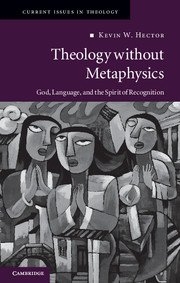4 - Reference and presence
Published online by Cambridge University Press: 05 June 2012
Summary
The preceding chapters have defended several elements of a therapeutic response to metaphysics: by elaborating a non-essentialist, non-correspondentist account of concepts and meaning, and explaining theological concept use in terms of the Spirit’s circulation through practices of intersubjective recognition, we arrived at the conclusion that one’s rejection of an essentialist-correspondentist picture of language’s relation to God need not be thought to entail that God stands at a distance from language. In order to complete the therapy, we must address two further issues, namely, intentionality and truth. This chapter takes up the issue of “intentionality,” by which I mean the object-directedness of one’s words and thoughts – the issue, that is, of the very idea that words could have God as their object. This issue can be further analyzed in terms of two sub-issues, namely, that of object-directedness – here, the use of words to refer to an object – and of object-directedness – the availability of such objects. It turns out that therapy is needed here, too, since intentionality, like meaning, has long been understood along essentialist-correspondentist lines and has, accordingly, given rise to the assumption that the failure of essentialist-correspondentist metaphysics entails that one cannot intend God with one’s words.
Metaphysics, intentionality, and homesickness
There are two issues involved in accounting for the putative “aboutness” of God-talk: issues related to the semantical notion of reference – paradigmatically the use of a name to pick out some object – and those related to an object’s very availability. Each of these has been understood in essentialist-correspondentist terms at various points in its career, which has made it appear that if God cannot be inscribed within a metaphysical framework, then one cannot refer to God, and God is never available to one.
- Type
- Chapter
- Information
- Theology without MetaphysicsGod, Language, and the Spirit of Recognition, pp. 148 - 200Publisher: Cambridge University PressPrint publication year: 2011

